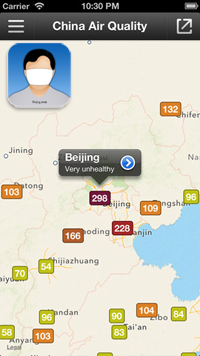
Pollution finally a front-page story in China
Pollution in Chinese mega-cities has reached unprecedented levels in the beginning of 2013. Suzanne Moll, IMS, describes the impact on people and the need for environmental journalism in China
By Suzanne Moll, IMS
 |
| The China air pollution index app tracks the air quality and pollution in 149 major cities in China with data from the US Embassy and Chinese authorities. Download |
Imagine having to set up a football field in the living room or having to buy a ping pong table to ensure that your children get some exercise. Imagine having to keep your children indoors. All parents can picture the effects both physically and mentally. Right now the people of China’s big cities and Beijing in particular are living through very difficult days. Everyone knows children need to move around, but playgrounds and sports fields are empty.
January has been the worst month for air pollution since 1954. According to Beijing meteorological authorities the capital experienced 23 days of constant smog warning forcing parents to keep their children indoors. The air is thick, foggy and toxic.
Pollution app measures air quality
As a service all citizens can now download the “China air pollution index“ app , which provides a scary read that rates the air quality in all major Chinese cities from “good”, to “unhealthy”, to “hazardous”. Some cities have two ratings – that of the authorities and that of the US Embassy. However, the ratings are more or less the same.
If one good thing has come from this extreme situation, climate issues and pollution are indisputably now on top on the Chinese agenda. The new local government in Beijing has declared it a top priority and has brought some factories to a standstill in order not to exacerbate pollution further. This attempt to control pollution was last seen during the 2008 Olympics where it had a major effect on air quality.
Environmental journalism to raise awareness
For several years IMS has been collaborating with Chinese journalists on how to report on climate change and renewable energy. This collaboration is now more timely than ever. The next step in the collaboration is a workshop with the participation of 10-12 Chinese journalists. The workshop starts in Beijing and continues in Denmark with visits to energy-related companies and environment research hubs. The week in Denmark allows the journalists to explore the cultural change Denmark has gone through since the seventies on the issue of creating a sustainable and healthy environment with regards to the impact on industry and production, and in the everyday thinking of Danish citizens.
| The signs of global warming are becoming more obvious and more frequent. A glut of extreme weather conditions is appearing globally. – Jim Yong Kim, President of the World Bank Group |
The workshop is planned for later this year and a call for interested journalists will be published in Chinese media.
However miniscule Denmark may seem in comparison to China, there is huge interest at the highest political levels towards learning about Danish energy politics. Upon their return to China, the journalists will continue to cover environmental and climate issues and support each other in the exchange of sources and information in general.
New year celebrations without fireworks
There is little doubt that an improvement must take place with regards to pollution and air quality in Chinese mega cities, but this is bound to take years. To make matters worse for the people of Beijing, there will be restrictions on the use of fireworks around the lunar New Year taking place in February. This is the time you spend with your family, exchanging presents and having fun with firecrackers in abundance. But due to the serious air quality situation, Xinhua (the official news agency) put out a statement from the Beijing Office of Fireworks and Firecrackers dictating the following: “To improve the air quality and create a favorable environment for you and your family members, please set off fewer fireworks or no fireworks, in order to reduce emissions of pollutants.”
For the Chinese, keeping your children indoors is one thing. But not being able to celebrate New Year in the traditional festive way that involves fireworks, has had a profound impact on people.




